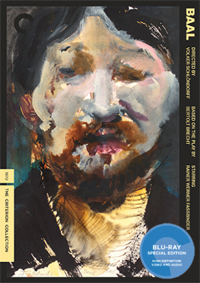 A missing cornerstone of Brechtian and New German Wave cinema is at last recuperated with the resurrection of Baal, a 1970 German television production directed by Volker Schlondorff, starring Rainer Werner Fassbinder, based on a 1918 play by Bertold Brecht. Arriving at the beginning of what would become illustrious and/or infamous careers for several of the key members of the New German Wave, it’s a cinema verite take on Brecht as it follows its titular and nebulous poet featuring Fassbinder, arguably cinema’s most egregious wild-child, as he wends a path of romantic and physical destruction in his rebellion against societal expectations. Named for various pagan gods, associated frequently with those related to stormy weather and fertility (with origins also relating to ‘lord’ and ‘demon’), in retrospect Baal plays like a thinly veiled extension of Fassbinder’s own savage persona (and which makes a compelling book-end with the director’s last appearance in front of the camera shortly before his death in Wolf Gremm’s Kamikaze 89, 1982).
A missing cornerstone of Brechtian and New German Wave cinema is at last recuperated with the resurrection of Baal, a 1970 German television production directed by Volker Schlondorff, starring Rainer Werner Fassbinder, based on a 1918 play by Bertold Brecht. Arriving at the beginning of what would become illustrious and/or infamous careers for several of the key members of the New German Wave, it’s a cinema verite take on Brecht as it follows its titular and nebulous poet featuring Fassbinder, arguably cinema’s most egregious wild-child, as he wends a path of romantic and physical destruction in his rebellion against societal expectations. Named for various pagan gods, associated frequently with those related to stormy weather and fertility (with origins also relating to ‘lord’ and ‘demon’), in retrospect Baal plays like a thinly veiled extension of Fassbinder’s own savage persona (and which makes a compelling book-end with the director’s last appearance in front of the camera shortly before his death in Wolf Gremm’s Kamikaze 89, 1982).
Due to Brecht’s widow, who apparently strongly disliked Schlondorff’s adaptation of the play, Baal was yanked from circulation, a situation unchanged until his grandchild allowed permission to release the film in 2011. The restoration received a slot in the 2014 Berlin International Film Festival, where it began to tour the festival circuit. A formidable array of familiar Fassbinder faces are paraded about in Baal’s periphery, such as Hanna Schygulla and Margarethe Von Trotta, who would become the lone female filmmaker out of the New German Wave five years later with The Lost Honor of Katharina Blum, which she co-directed with husband Schlondorff. Their appearance here is a curious stepping stone to each of their respective masterpieces later on in the decade. Schlondorff had previously directed two features, most notably his 1966 debut Young Torless, considered the starting period of the film movement. Fassbinder had already released Katzelmacher and Love is Always Colder Than Death the year prior, making Baal one of several flurried film projects he was involved with in the frenetic period of output. Likewise, Gunther Kaufman and Marian Seidowsky, each making early supporting appearances in the works of directors they would both frequently work for.
The film’s most striking, and potentially off-putting aspect is Dietrich Lohmann’s handheld 16mm cinematography, which gives Baal a sort of home-video DIY vibe, which clashes surreptitiously with Brecht’s theatrical prose (and leading the anguish of many of the poet’s victims to a sometimes-camp aesthetic). A tribute to the cult of genius, Baal is like many a portrait of a brooding poet—abusive, outrageous and endlessly narcissistic. Style and substance recall early portraits of intellectual malaise in the works of Bruno Dumont, with Baal’s viciousness only outdone by the memorable prose of Brecht. Rejected by bourgeois society, Baal inflicts his cynicism on all those in his wake, which would include taxi drivers subjected to his poetry and the myriad of women and men who become his lovers, and in one case, murder victim. A fresh-faced Margarethe Von Trotta stands out in this experimental take on the material, which plays like the misanthropic overlord to the gender sparring of Alex Ross Perry.
Disc Review:
Schlondorff supervised this new 2K digital restoration (which is the fifth of his directorial efforts to join Criterion, following Young Torless, Coup de Grace, The Lost Honor of Katharina Blum, and his Palme d’Or winning The Tin Drum), which is presented in 1.37:1 with uncompressed monaural soundtrack. Both picture and sound quality are impressive with this brand-new release, the restoration allowing for a clear transfer scanned from 16mm original camera negative.
Volker Schlondroff, 2015:
Criterion includes this 2015 forty-eight-minute interview with Schlondorff as he discusses the production of Baal and working with Fassbinder and his usual troupe of actors.
Volker Schlondorff, 1973:
Schlondorff recorded this near five-minute segment in 1973 for French television, discussing the distinct approach to the making of Baal.
Margarethe Von Trotta:
Criterion recorded this 2017 twelve-minute interview with Margarethe Von Trotta in Munich, who discusses the cultural climate at the time which influenced the making of Baal.
Eric Rentschler:
Criterion recorded this 2017 seventeen-minute interview with Eric Rentschler, film historian and Arthur Kingsley Porter Professor of Germanic languages and literature at Harvard University, who discusses Baal as a ‘time capsule’ and ‘treasure trove.’
Ethan Hawke and Jonathan Marc Sherman:
Playwright Jonathan Marc Sherman and actor Ethan Hawke recorded this sixteen-minute conversation in 2017 for Criterion as they discuss their 2013 stage collaboration Clive, which was an adaptation of Baal (which they refer to as punk rock).
Final Thoughts:
An exemplary piece of experimental adaptation from the New German Wave, Baal is a daring, contemporary conversation piece from an incredibly prolific chapter of cinema history.
Film Review: ★★★½/☆☆☆☆☆
Disc Review: ★★★★/☆☆☆☆☆


